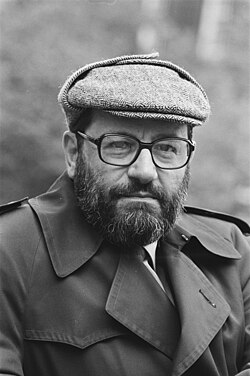Umberto Eco Quote
Often during our journey I heard William mention the simple, a term by which some of his brothers denoted not only the populace but, at the same time, the unlearned. This expression always seemed to me generic, because in the Italian cities I had met men of trade and artisans who were not clerics but were not unlearned, even if their knowledge was revealed through the use of the vernacular. And, for that matter, some of the tyrants who governed the peninsula at that time were ignorant of theological learning, and medical, and logical, and ignorant of Latin, but they were surely not simple or benighted. So I believe that even my master, when he spoke of the simple, was using a rather simple concept. But unquestionably Salvatore was simple.
Often during our journey I heard William mention the simple, a term by which some of his brothers denoted not only the populace but, at the same time, the unlearned. This expression always seemed to me generic, because in the Italian cities I had met men of trade and artisans who were not clerics but were not unlearned, even if their knowledge was revealed through the use of the vernacular. And, for that matter, some of the tyrants who governed the peninsula at that time were ignorant of theological learning, and medical, and logical, and ignorant of Latin, but they were surely not simple or benighted. So I believe that even my master, when he spoke of the simple, was using a rather simple concept. But unquestionably Salvatore was simple.
Related Quotes
Certainly we can say that the pace of modern life, increased and supported by our technology in general and our personal electronics in particular, has resulted in a short attention span and an addict...
About Umberto Eco
Eco wrote prolifically throughout his life, with his output including children's books, translations from French and English, in addition to a twice-monthly newspaper column "La Bustina di Minerva" (Minerva's Matchbook) in the magazine L'Espresso beginning in 1985, with his last column (a critical appraisal of the Romantic paintings of Francesco Hayez) appearing 27 January 2016. At the time of his death, he was an Emeritus professor at the University of Bologna, where he taught for much of his life. In the 21st century, he has continued to gain recognition for his 1995 essay "Ur-Fascism", where Eco lists fourteen general properties he believes comprise fascist ideologies.
